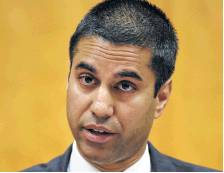FCC unleashes conservative television giant
By Cecilia Kang, Eric Lipton and Sydney Ember NEW YORK TIMES
WASHINGTON — The day before President Donald Trump’s inauguration, the top executive of Sinclair Broadcast Group, the nation’s largest owner of television stations, invited an important guest to the headquarters of the company’s Washington-area ABC affiliate.
The trip was, in the parlance of the business world, a deal closer.
The invitation from David Smith, chairman of Sinclair, went to Ajit Pai, a commissioner on the Federal Communications Commission who was about to be named the broadcast industry’s chief regulator. Smith wanted Pai to ease up on efforts under President Barack Obama to crack down on media consolidation, which were threatening Sinclair’s ambitions to grow even bigger.
Smith did not have to wait long.
Within days of their meeting, Pai was named chairman of the FCC. And during his first 10 days on the job, he relaxed a restriction on television stations’ sharing of advertising revenue and other resources — the exact topic Pai discussed with Smith and one of his business partners, according to records examined by the New York Times.
“These are invaluable and effective tools, which were taken away by the commission,” according to a summary of their meeting filed with the FCC.
It was only the beginning. Since becoming chairman in January, Pai has undertaken a deregulatory blitz, enacting or proposing a wish list of fundamental policy changes advocated by Smith and his company. Hundreds of pages of emails and other documents obtained under the Freedom of Information Act reveal a rush of regulatory actions has been carefully aligned with Sinclair’s business objectives.
Pai’s deregulatory drive
The moves, which include easing a cap on how many stations a broadcaster can own, have opened up lucrative opportunities for Smith, among them a $3.9 billion bid to buy Tribune Media, another large owner of stations.
Pai’s deregulatory drive has also helped win him a following as a champion of pro-business, conservative causes — even leading some Republicans to approach him since he was first named to the FCC in 2012 about running for elected office.
An examination of the FCC records shows that the Smith-Pai alliance does not follow the familiar script of a lobbyist with deep pockets influencing policy. Instead, it is a case of a powerful regulator and an industry giant sharing a political ideology, and suddenly, with the election of Trump, having free rein to pursue it — with both Smith, 66, and Pai, 44, reaping rewards.
Neither Pai nor Smith would comment for this article.
Associates say both men believe that local television stations, which fall under the commission’s rules because they broadcast over federally owned airwaves, are at a disadvantage when competing against cable companies and online streaming services such as Comcast and Netflix.
Tina Pelkey, spokeswoman for Pai, said the new chairman had not taken steps to help Sinclair specifically; his concerns relate to the broadcast industry generally.
“It has nothing to do with any one company,” Pelkey said.
Other broadcast companies, as well as the National Association of Broadcasters, have pushed for some of the same changes that have benefited Sinclair.
Loosened regulatory requirements, Sinclair executives said, will help even the playing field and benefit millions of Americans who rely on broadcast stations for news and entertainment by allowing the companies to invest in new equipment and technology.
“Thankfully we’ve got Chairman Pai, who’s launched an action to look at antiquated rules, which we think artificially tipped the playing field away from TV broadcast,” Christopher S. Ripley, who became Sinclair’s chief executive in mid-January, said in a speech in June.
Change could be profound
Critics say the rollback undermines the heart of the FCC mission to protect diversity, competition and local control in broadcast media. It also gives an increasingly prominent conservative voice in broadcast television — Sinclair has become known for its right-leaning commentary — an unparalleled national platform, as television remains the preferred source for most Americans of news, according to Pew.
A merger with Tribune would transform Sinclair into a media juggernaut, with reach into 7 of 10 homes through more than 200 stations in cities as diverse as Eureka, California, and Huntsville, Ala. The company would have a significant presence in important markets in several electoral swing states, including Pennsylvania, Ohio and North Carolina, and would gain entry into the biggest urban markets: New York, Los Angeles and Chicago.
The result would illustrate the real-world stakes of the Trump administration’s headlong pursuit of dismantling regulations across government. The rollback at the FCC, a microcosm of the broader effort, pleases business interests and many Republicans who complain that regulators are heavy-handed and hostile in their approach, while it raises alarms among free-speech advocates and many Democrats who say consumers suffer without aggressive oversight.
“I worry that our democracy is at stake because democracy depends on a diversity of voices and competition of news outlets,” said Rep. Frank Pallone Jr. of New Jersey, the top Democrat on the House Energy and Commerce Committee.
If Sinclair’s past is any guide, the changes for viewers could be profound.
The company has a history of cutting staffs and shaving costs by requiring stations to share news coverage, in that way reducing unique local content. And it has required stations to air conservative-leaning segments, including law-and-order features from its “Terrorism Alert Desk,” as well as punditry from Republicans like Boris Epshteyn, a former surrogate to Trump, who was still seen visiting the White House after joining Sinclair.
